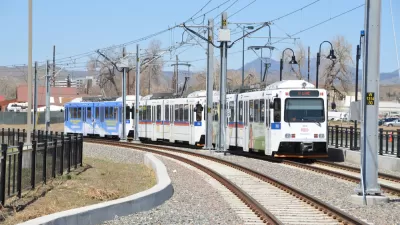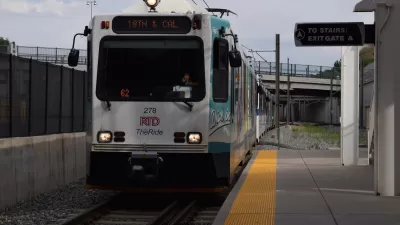The agency released a draft plan to eliminate regional zones, make airport trips more affordable, and reduce fares systemwide.

The Denver area Regional Transportation District (RTD) has unveiled a new draft plan for lowering fares, eliminating regional zones, and reducing the cost of monthly passes, reports Jon Murray in the Denver Post. The plan is based on the results of an “intensive systemwide study” undertaken by RTD in 2021. “The study’s mandate was to simplify RTD’s fare structure and reduce riders’ costs, which are at the upper end among U.S. transit agencies, especially for longer trips.”
Murray details the proposed changes, including lowering local fares and day pass fees, eliminating the regional fare, and reducing the cost of a monthly pass to $88, which would also include trips to the airport. The plan also suggests making fares free for youth under 19, increasing the low-income discount to 50 percent, and expanding its eligibility.
According to Murray, “More changes are possible, and RTD in the coming months will perform a federally required equity analysis to comply with civil rights laws.” The RTD board will vote on a final version in July, with new fares taking effect in early 2024.
The agency says it can afford the changes, since only 8 percent of operating expenses are covered by fare revenue, down from almost 16 percent before the Covid-19 pandemic. “The agency’s board briefing document projects that under the recommended fare and pass changes, revenue would drop next year to $73.5 million from $78.5 million, depending on whether the board approves a zero-fare youth pass pilot,” but ridership is expected to increase by 8 to 14 percent.
See the source article for more details on the proposed changes.
FULL STORY: RTD weighs cheaper fares and passes, with no regional zones — but airport trips still would cost much more

Alabama: Trump Terminates Settlements for Black Communities Harmed By Raw Sewage
Trump deemed the landmark civil rights agreement “illegal DEI and environmental justice policy.”

Study: Maui’s Plan to Convert Vacation Rentals to Long-Term Housing Could Cause Nearly $1 Billion Economic Loss
The plan would reduce visitor accommodation by 25% resulting in 1,900 jobs lost.

Planetizen Federal Action Tracker
A weekly monitor of how Trump’s orders and actions are impacting planners and planning in America.

Waymo Gets Permission to Map SF’s Market Street
If allowed to operate on the traffic-restricted street, Waymo’s autonomous taxis would have a leg up over ride-hailing competitors — and counter the city’s efforts to grow bike and pedestrian on the thoroughfare.

Parklet Symposium Highlights the Success of Shared Spaces
Parklets got a boost during the Covid-19 pandemic, when the concept was translated to outdoor dining programs that offered restaurants a lifeline during the shutdown.

Federal Homelessness Agency Places Entire Staff on Leave
The U.S. Interagency Council on Homelessness is the only federal agency dedicated to preventing and ending homelessness.
Urban Design for Planners 1: Software Tools
This six-course series explores essential urban design concepts using open source software and equips planners with the tools they need to participate fully in the urban design process.
Planning for Universal Design
Learn the tools for implementing Universal Design in planning regulations.
Caltrans
Smith Gee Studio
Institute for Housing and Urban Development Studies (IHS)
City of Grandview
Harvard GSD Executive Education
Toledo-Lucas County Plan Commissions
Salt Lake City
NYU Wagner Graduate School of Public Service





























